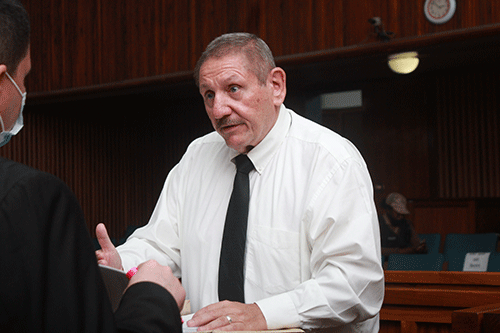A clinical psychologist who assessed the state of mind of admitted accused killer Ernst Josef Lichtenstrasser has said his confession on 15 May 2019 was due to pressure by the police.
Ute Sinkala, who was hired by Lichtenstrasser’s sister, told Windhoek High Court Judge Christi Liebenberg that in her opinion, the confession was due to immense pressure from his interrogators during several hours of pressure and threats.
“In my view, he would have done and say anything to end the ‘torture’ as he saw it, she told the court. According to the psychologist, Lichtenstrasser was not in a physical condition to make a reliable confession and the confession should be dismissed.
“Mr Lichtenstrasser was vulnerable and compromised and not in his sober mind and senses when he made the confession,” she told the court.
According to her, Lichtenstrasser was sleep deprived, in severe pain and weak because of his hunger strike and was extremely fatigued. She further said that his mind was befuddled with thoughts of suicide because the police threatened to arrest his wife as a conspirator. Also, she said, the promises of the police who interrogated him that they will help him with bail and a lenient sentence combined with the threats were enough to make impact on an already impressionable mind.
“Mr Lichtenstrasser resorted to sacrifice himself to save his wife,” she told the judge. According to Sinkala, when she watched the video of the confession, she could see that Lichtenstrasser was exhausted to the brink of collapse.
Deputy prosecutor general Antonia Verhoef did not share the sentiments of the psychologist. According to her, Lichtenstrasser seemed quite normal in the video. His voice was clear an he was speaking confidently, she said.
She further told the psychologist that in one instance Lichtenstrasser could be heard telling the police that he was comfortable when enquiries were made.
She said Lichtenstrasser even told the police that his job was not to feel comfortable. She also questioned Sinkala on various discrepancies in his oral testimony in court and what he told her during their interviews.
The psychologist could not answer on the differences and only suggested that it have been the manner in which she asked her questions that he was more open with her than with the court. On his mental health and his diagnosis of major depressive disorder, the State advocate asked the psychologist if that would not be a normal consequence of being detained and facing serious charges. Sinkala agreed, but also mentioned that the additional pressure of the interrogation by the police was also a factor.
Lichtenstrasser is on trial for the murders of two senior executives of the Namibia Institute of Mining and Technology, Eckhardt Mueller, who was the executive director at the time, and his deputy, Heinz Heimo Hellwig, who were gunned down in cold blood. It is alleged by the State that he fired several shots at them at the entrance of the Arandis NIMT offices at the Erongo mining town on 15 April 2019. He is now denying the confession was made while he was in his sober mind and senses and claims that it was coerced.
He made the confession to the police, which was admitted as evidence by Judge Liebenberg. Lichtenstrasser is represented by Legal Aid lawyer Albert Titus.
The case continues today, and Lichtenstrasser remains in custody.
– rrouth@nepc.com.na



